Unit 5 Topic 1
仁爱版七年级下册英语Unit 5 Topic 1单项选择易错专练(含答案)
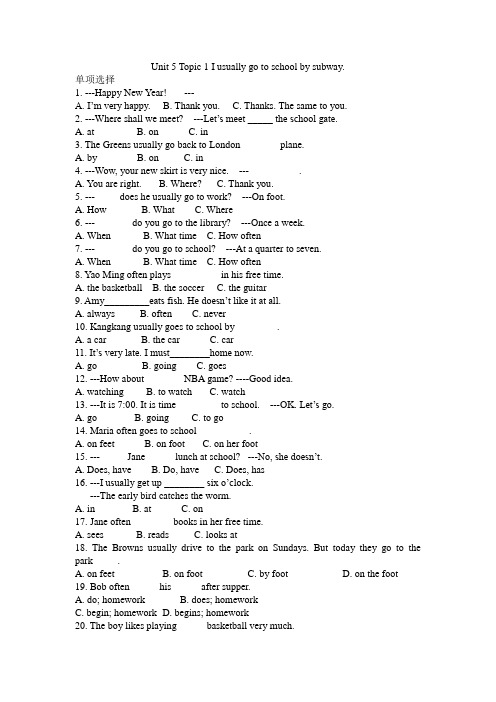
Unit 5 Topic 1 I usually go to school by subway.单项选择1. ---Happy New Year! --- ____________A. I’m very happy.B. Thank you.C. Thanks. The same to you.2. ---Where shall we meet? ---Let’s meet _____ the school gate.A. atB. onC. in3. The Greens usually go back to London _______ plane.A. byB. onC. in4. ---Wow, your new skirt is very nice. ---__________.A. You are right.B. Where?C. Thank you.5. ---_____does he usually go to work? ---On foot.A. HowB. WhatC. Where6. ---_______ do you go to the library? ---Once a week.A. WhenB. What timeC. How often7. ---_______ do you go to school? ---At a quarter to seven.A. WhenB. What timeC. How often8. Yao Ming often plays _________ in his free time.A. the basketballB. the soccerC. the guitar9. Amy_________eats fish. He doesn’t like it at all.A. alwaysB. oftenC. never10. Kangkang usually goes to school by ________.A. a carB. the carC. car11. It’s very late. I must________home now.A. goB. goingC. goes12. ---How about _______ NBA game? ----Good idea.A. watchingB. to watchC. watch13. ---It is 7:00. It is time ________ to school. ---OK. Let’s go.A. goB. goingC. to go14. Maria often goes to school __________.A. on feetB. on footC. on her foot15. ---_____ Jane _____ lunch at school? ---No, she doesn’t.A. Does, haveB. Do, haveC. Does, has16. ---I usually get up ________ six o’clock.---The early bird catches the worm.A. inB. atC. on17. Jane often ________books in her free time.A. seesB. readsC. looks at18. The Browns usually drive to the park on Sundays. But today they go to the park_____.A. on feetB. on footC. by footD. on the foot19. Bob often _____ his _____ after supper.A. do; homeworkB. does; homeworkC. begin; homeworkD. begins; homework20. The boy likes playing _____ basketball very much.A. aB. anC. theD. /21. ---_____ does he meet his friends?---_____ a month.A. How often; TwiceB. How long; TwiceC. When; TwoD. What time; Two22. ---What do you usually do _____ weekdays after school?---I usually play football.A. inB. atC. onD. for23. Mr. King sometimes _____ the subway home.A. takeB. takingC. takesD. to take24. ---What does Fang Yan do in her free time?---She often goes _____.A. swimmingB. swimC. to swimD. swims25. ---What time do you usually go to bed?---_____ about a quarter to ten.A. ForB. AtC. InD. On26. Zhao Lin _____ to Beijing by train often. He usually goes by plane.A. isn’t goB. doesn’t goC. doesn’t goesD. don’t go27. Sam _____ walks to school. He always go to school by bike.A. sometimesB. oftenC. neverD. seldom28. It’s time ________ school.A. toB. atC. forD. in29. Helen usually goes to school by_________.A. a carB. the carC. carsD. car30. Kangkang goes home ________ foot.A. byB. onC. inD. of31. Our holiday is interesting. How about_________?A. youB. yourC. yoursD. for you32. ---_______ do you usually go to school? ---By bus.A. WhatB. HowC. WhereD. When33. Nice _____ you again!A. seeB. to seeC. seeingD. look34. Almost all students walk or ____ a bus, very few students ___ bike.A. take; ridingB. by; byC. take; byD. take; ride35. Tom, how ____________ go home?A. atB. toC. withD. in36. Your new coat _______ very nice.A. lookB. to lookC. lookingD. looks37. Allen gets t New York _________.A. by the planeB. on planeC. by planeD. on the air38. ----__________does he go to work?---He goes to work at six o’clock.A. HowB. WhereC. What timeD. What about39. ______weekdays we go to school at 7 o’clock.A. AtB. OnC. OfD. In40. He _____to the park.A. goes neverB. never goesC. never go D .go never41.---What time do the classes finish?---At_____( 11:50).A.eleven fiveB.eleven to fiftyC.ten to twelveD.eleven past fifty42. Sally never_____to school.A. walksB. walkC. is walkingD. to walk43. It’s time_____breakfast.A. to haveB. haveC. havingD. has44. He looks unhappy. What’s the matter______him?A. forB. onC. withD. about45.---Do you often watch TV after homework?---No, ______.A. oftenB. alwaysC. sometimesD. usually46. Kangkang often plays ________ after class.A. soccersB. a soccerC. the soccerD. soccer47. ---How did you go there?---I went there______. It was near.A. by a busB. on footC. with a bicycleD. by plane48. ---______does the math class finish?---At about 5 o’clock.A. HowB. How oftenC. What timeD. Where49. --- _____ does Jim write to his friend?--- Seldom.A. How manyB. How soonC. How oftenD. How about50. The girl plays _____ piano every day.A. theB. aC. anD. \51. Do you _________ newspapers after lunch?A. readB. lookC. see.D. watch52. My friend Tom likes______basketball after school.A. playingB. playsC. is playingD. to play53. Most students in our class come to school by bike. Very ____ of us come by car.A. manyB. muchC. fewD. little54. ---How often do you go swimming?---__________. I don’t like going swimming.A. SometimesB. Very oftenC. NeverD. Twice a week55. ---How is your school life?---_________!A. Very niceB. EasyC. CleanD. Very much56. ---How often does your mother go shopping?---_______.A. YesterdayB. TodayC. Once a weekD. At night57. ---How often do you do outdoor activities?---_____.A. Every dayB. EverydayC. Three dayD. Once58. ________pictures do you have?A. How manyB. How muchC. How oldD. How long59. Zhao Lin goes home __________foot.A. byB. onC. inD. at60. They often _________ after class.A. play the guitarB. play the basketballC. play guitarD. plays soccer61. Xiao Liu _______ lunch at school.A. haveB. eatC. hasD. to have62. He can’t speak English, so he______speaks English.A. alwaysB. oftenC. neverD. sometimes63. The students sometimes _________ in the park after school.A. draw picturesB. flying kitesC. runningD. catches birds.答案:1-5 CAACA 6-10 CBCCC11-15 AACBA 16-20 BBBBD21-25 ACCAB 26-30 BCCDB31-35 CBBCB 36-40 DCCBB41-45 CAACC 46-50 DBCCA51-55 AACCA 56-60 CBABA61-63 CCA。
七年级英语(仁爱版)下册 Unit-5-Topic-1 知识点总结语言点归纳

知识点七年级英语(仁爱版)下册Unit-5-Topic-1语言点归纳Unit 5 Topic 1I 重点词汇和短语gate, by, always, plane, train, ship, boat, Ms., grandmother, group, weekday, early, bird, catch, seldom, walk, never, sometimes, ride, park, watch, TV, homework, life, American, or, few, day, rest, play, basketball, swim, ball, game, read, listen, library, once, twice, week, every, must, first, music, begin, while, wall, bed.the same to, come on, on foot, by plane, know about, for a while, watch TV, do (one’s) homework, have lunch, at school, have a rest, be different from, go swimming, listen to, go to bed, go to school, have classes.II 语言点Section A1. a) ---Happy New Year! ---- The same to you! / You, too. 新年快乐!也祝你新年快乐!b) ----Happy birthday! -----Thank you! 生日快乐!谢谢!2. How about you? = What about you? 你怎么样?3. Oh, your new bike looks very nice! 哦,你的新自行车看起来很好看。
仁爱版英语七年级下册Unit5Topic1测试卷及参考答案
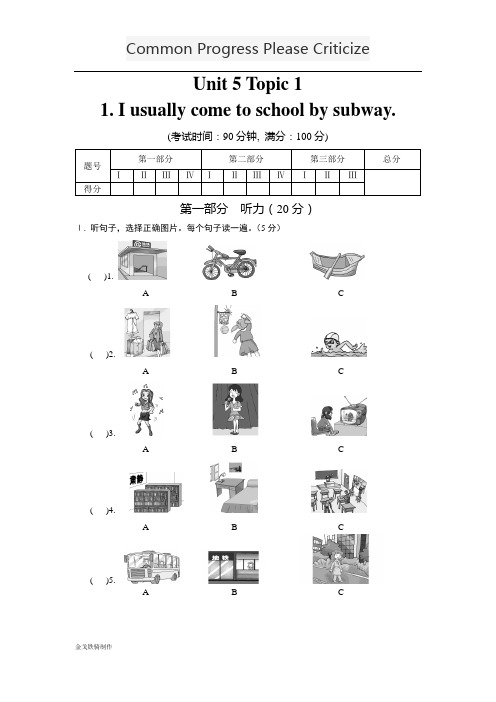
Unit 5 Topic 11. I usually come to school by subway.(考试时间:90分钟, 满分:100分)第一部分第二部分第三部分总分题号ⅠⅡⅢⅣⅠⅡⅢⅣⅠⅡⅢ得分第一部分听力(20分)Ⅰ. 听句子,选择正确图片。
每个句子读一遍。
(5分)( )1.A B C( )2.A B C( )3.A B C( )4.A B C( )5.A B CⅡ. 听句子,选择正确答语。
每个句子读一遍。
(5分)( )6. A. Oh, I’m not happy. B. The same to you. C. We are all happy.( )7. A. I have no free time. B. How about you?C. I often play basketball.( )8. A. No, I don’t. B. Yes, he does.C. No, I walk to school.( )9. A. Yes, it is. B. You’re right. C. Thank you.( )10. A. I like playing it very much. B. I want to play it very much.C. Three times a week.Ⅲ. 听对话,选择正确答案。
每段对话读两遍。
(5分)( )11. How does Michael usually come to school?A. By bus.B. By bike.C. On foot.( )12. What does the man often do on Sundays?A. He plays computer games.B. He plays basketball.C. He plays football.( )13. How often does Yu Ming go to the zoo?A. Every month.B. Every day.C. Every week.( )14. How does Miss Wang sometimes come to school?A. By bike.B. By bus.C. On foot.( )15. Where does Zhou Lina usually have lunch?A. In her office.B. At home.C. At school.Ⅳ.第二部分英语知识运用(55分)Ⅰ. 单项选择。
九年级英语下册 Unit 5 China and the World Topic 1 China attracts millions of tourists from all over
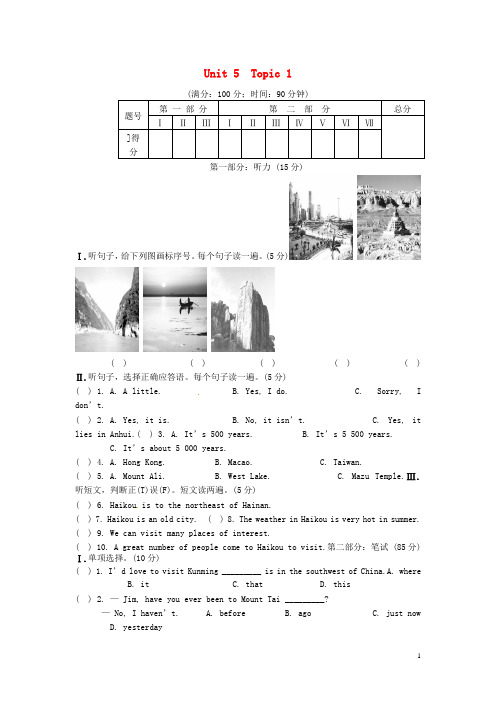
Unit 5 Topic 1题号第一部分第二部分总分ⅠⅡⅢⅠⅡⅢⅣⅤⅥⅦ]得分第一部分:听力 (15分)Ⅰ.听句子,给下列图画标序号。
每个句子读一遍。
(5分)( ) ( ) ( ) ( ) ( )Ⅱ.听句子,选择正确应答语。
每个句子读一遍。
(5分)( ) 1. A. A little. B. Yes, I do. C. Sorry, I don’t.( ) 2. A. Yes, it is. B. No, it isn’t. C. Yes, it lies in Anhui.( ) 3. A. It’s 500 years. B. It’s 5 500 years.C. It’s about 5 000 years.( ) 4. A. Hong Kong. B. Macao. C. Taiwan.( ) 5. A. Mount Ali. B. West Lake. C. Mazu Temple.Ⅲ.听短文,判断正(T)误(F)。
短文读两遍。
(5分)( ) 6. Haikou is to the northeast of Hainan.( ) 7. Haikou is an old city.( ) 8. The weather in Haikou is very hot in summer. ( ) 9. We can visit many places of interest.( ) 10. A great number of people come to Haikou to visit.第二部分:笔试 (85分) Ⅰ.单项选择。
(10分)( ) 1. I’d love to visit Kunming _________ is in the southwest of China.A. whereB. itC. thatD. this( ) 2. — Jim, have you ever been to Mount Tai _________?— No, I haven’t. A. before B. ago C. just nowD. yesterday( ) 3. Go downstairs and _________.A. fetch me the inkB. fetch the ink to meC.fetch the ink me D. fetched the ink for me( ) 4. Mount Song lies _________ Henan Province.A. toB. onC. fromD. in( ) 5. The surrounding areas of West Lake are the _________ of the famous Dragon Well Tea.A. houseB. familyC. homeD. place( ) 6. China is a big country _________ has a history of about 5, 000 years.A. thatB. whoC. in whichD. in that( ) 7. Luoyang _________ “the Home of Peonies(牡丹)”.A. is famous asB. is famous forC. is famousD. called( ) 8. We visited Jokhang Temple and Yangba Well, and also saw so many_________ people and some other places of _________.A. interested; interestedB. interested; interestC. interesting; interestedD. interesting; interest( ) 9. This place is well worth _________.A. visitB. to visitC. visitingD.visits( ) 10. There are a lot of places which _________ by visitors here. They are Shegutai, Wuliu, Huangcangyll and so on.A. must not missB. shouldn’t missC. shouldn’t be missedD.can’t missⅡ.情景交际。
仁爱版英语八下 Unit 5 Topic 1 重点知识点总结
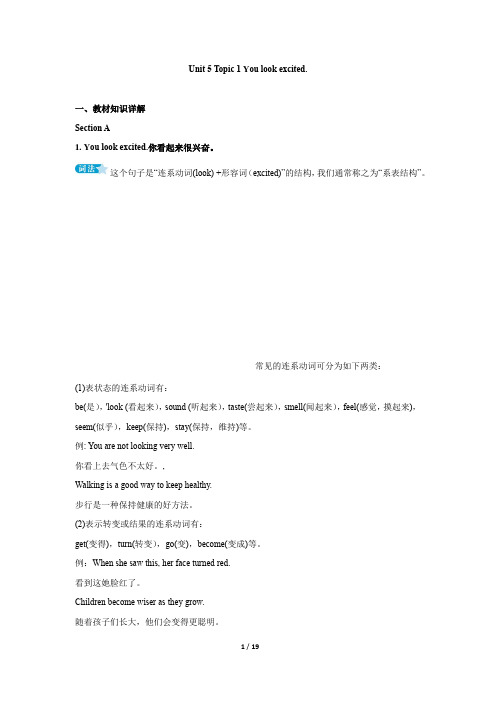
Unit 5 Topic 1 Y ou look excited.一、教材知识详解Section A1. Y ou look excited.你看起来很兴奋。
这个句子是“连系动词(look) +形容词(excited)”的结构,我们通常称之为“系表结构”。
常见的连系动词可分为如下两类:(1)表状态的连系动词有:be(是),'look (看起来),sound (听起来),taste(尝起来),smell(闻起来),feel(感觉,摸起来),seem(似乎),keep(保持),stay(保持,维持)等。
例: You are not looking very well.你看上去气色不太好。
,Walking is a good way to keep healthy.步行是一种保持健康的好方法。
(2)表示转变或结果的连系动词有:get(变得),turn(转变),go(变),become(变成)等。
例:When she saw this, her face turned red.看到这她脸红了。
Children become wiser as they grow.随着孩子们长大,他们会变得更聪明。
2. My father and mother want to invite your parents to go to the movies.我父母想邀请你父母一起去看电影。
invite vt.邀请。
固定短语:invite sb.to do sth/to somewhere例:He invites us to his restaurant. = He invites us to go to his restaurant.他邀请我们去他的餐馆。
go to the movies = go to the cinema 去看电影invitation n.邀请。
例:I have an open invitation to visit my friend in Japan.我在日本的朋友邀请我随时去看他。
初二Unit 5 重点句型 汉译英
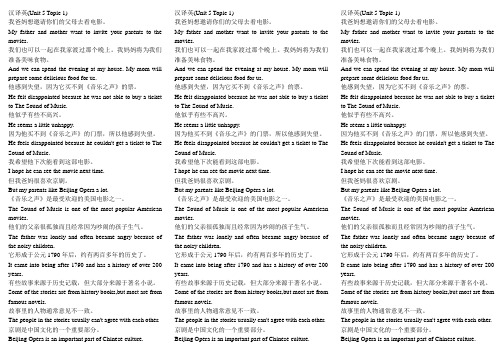
汉译英(Unit 5 Topic 1)我爸妈想邀请你们的父母去看电影。
My father and mother want to invite your parents to the movies.我们也可以一起在我家渡过那个晚上。
我妈妈将为我们准备美味食物。
And we can spend the evening at my house. My mom will prepare some delicious food for us.他感到失望,因为它买不到《音乐之声》的票。
He felt disappointed because he was not able to buy a ticket to The Sound of Music.他似乎有些不高兴。
He seems a little unhappy.因为他买不到《音乐之声》的门票,所以他感到失望。
He feels disappointed because he couldn't get a ticket to The Sound of Music.我希望他下次能看到这部电影。
I hope he can see the movie next time.但我爸妈很喜欢京剧。
But my parents like Beijing Opera a lot.《音乐之声》是最受欢迎的美国电影之一。
The Sound of Music is one of the most popular American movies.他们的父亲很孤独而且经常因为吵闹的孩子生气。
The father was lonely and often became angry because of the noisy children.它形成于公元1790年后,约有两百多年的历史了。
It came into being after 1790 and has a history of over 200 years.有些故事来源于历史记载,但大部分来源于著名小说。
Unit 5 Topic 1【复习课件】八年级英语下册单元复习(仁爱版)

轻轻松松进课堂
He is _u_p_s_e_t /__u_n_h_a_p_p_y _d_is_a_p_p_o_i_n_te_d.
She is very ___s_ad_.
轻轻松松进课堂
She looks very f__r_ig_h_t_e_n_ed. She seems very frightened.
• 1. Mr. Brown couldn’t get a ticket to Avatar, so he
was unhappy.
( F)
• 2. Jane likes the film, The Sound of Music,
because it is very interesting.
() T
• 3. The opera, Cats, is Maria’s favorite. ( T)
3.首先,开始
4.fall into
4.落入
5.in the end
5.最后
6.go mad
6.变疯
e into being 7.形成
8.be full of
8.充满
9.变得对…感兴
9.become interested in趣 10.与…和解
10.make peace with 11.以…结束
英 语
仁爱版 八年级 上册
Unit 5 Feeling Excited 1. You look excited.
1. You look excited.
基础知识过过过 轻轻松松进课堂 高频考点导导航 研析考题点迷津 梳理语法建支架 指导写作构思路
基础知识过过过
1. film/movie电影;影片 3. almost 几乎,差不多
初一英语下册unit5topic1知识点总结

初一英语下册unit5topic1知识点总结初一英语下册unit5topic1知识点总结topic1Howdoyougotoschool?一、重点词语:1.wakeup醒来,唤醒getup起床2.gotoschool去上学gohome回家3.godancing/shopping/skating/swimming去跳舞;购物、滑冰;游泳godoingsomething可用于表达去进行某种娱乐休闲活动。
4.表示交通方式:onfoot步行byboat坐船byship坐船byair乘飞机byplane乘飞机bytrain坐火车bysubway搭乘地铁bycar坐小汽车bybus坐公共汽车bybike骑自行车5.takethesubway/bus/car搭乘地铁;公共汽车;小汽车6.driveacartowork=gotoworkbycar驾车去上班takeabustowork=gotoworkbybus乘公共汽车去上班gotoschoolonfoot=walktoschool步行去上学7.rideabike/horse骑自行车;骑马8.afterschool/class放学以后;下课以后9.playthepiano/guitar/violin弹钢琴;吉他;小提琴playbasketball/soccer/football打篮球;踢足球;打橄榄球playcomputergames玩电脑游戏playwithacomputer玩电脑playsports做运动10.nextto紧挨着,在…旁边11.aplanofmyschool一幅我们学校的平面图12.onweekdays在工作日atweekends在周末13.havebreakfast/lunch/supper/dinner/meals吃早餐;中餐;晚餐;正餐;一日三餐haveclasses/lessons/ameeting上课;上课;开会14.watchTV/movies/games/theanimals看电视;电影;比赛;动物readnovels/newspapers/books看小说;报纸;书15.washone’sfac e/clothes洗脸;衣服16.反义词:up–down,early–late近义词:quickly–fastgetupearly早起belatefor迟到17.thefirst/second/third/fourthday第一;二;三;四天18.cleanthehouse打扫房子19.表示建筑物(尤其学校建筑物):ontheplayground在操场atschool/home/table在学校;家里;桌旁inacomputerroom/teachers’office/classroombu ilding/gym /library/lab/canteen在电脑室;教师办公室;教学楼;体操馆;图书馆;实验室;食堂20.aroundsixo’clock=ataboutsixo’clock大约在六点21.频率副词:never,seldom,sometimes,often,usually,always二、重点句型:1.It’stimetogetup.该起床的时候了。
仁爱版八年级下 Unit 5 Topic 1 课文讲解

Unit 5 Topic 1Section A1.How are you doing?你最近怎么样?如果最近感觉不错的话就回答:I'm fine/quite well,thanks. (And you?),但是如果最近比较糟糕倒霉的话可以这样说:Not so well/Rather badly.还有如果一般般的话就可以说:Just so so/Not so bad.2.You look excited.你看起来很兴奋。
这是一个系表结构,即:连系动词(look )+形容词( excited)。
常见的连系动词可以分为以下两大类:(1)表示状态的连系动词:be(是),look(看起来),sound(听起来),smell(闻起来),feel(摸起来,感觉),taste(尝起来),seem(似乎,好像),keep(保持),stay(保持)等。
如:My grandma is fine.我奶奶很好。
That cat looks very funny.那只猫看起来很滑稽。
The song sounds good.这首歌听起来不错。
The food smells nice.这食物闻起来香。
I always feel tired these days.这些天我总是感觉累。
Miss Tang seems very angry.唐老师好像非常生气。
Running is a good way to keep healthy.跑步是保持健康的一个好方法。
(2)表示动态的连系动词:get(变得),turn(转变),go(变),become(变成) 等。
如:Spring is here; the weather is getting warmer andwarmer.春天来了,天气越来越暖和了。
When she saw the teacher coming into theclassroom,her face turned red at once.当她看见老师正走进教室的时候,她的脸立刻就变红了。
初中英语 仁爱7下Unit 5 Topic1 知识点

Unit 5 Topic1 知识点重点单词1.大门2.乘(车等);靠近3.总是,一直4.快点儿;加油5.步行6.飞机7.火车8.船,轮船9.小船,轮船10.平日11.早的12.鸟13.捉住;接住14.有时15.很少;不常16.步行;散步17.决不,从来没有18.骑(自行车、马等)19.公园20.观看;注视21.电视;电视机22.看电视23.电影24.开始25.在学校;在上课26.在……后27.床28.篮球29.游;游泳30.听,仔细听31.音乐;乐曲32.图书馆,图书室33.周;星期34.一次;从前35.两次;两倍36.伟大的,极好的37.墙38.长城39.生活;生命40.美国人41.或者;否者42.结束;穿过43.在…上面44.更多的;更多45.谈话重点短语1.go …on foot = walk ( to )…2.at the school gate在学校大门口3.on weekdays在平日 ,在工作日4.on weekends=on the weekend在周末5.You are right. = That’s right. 你是对的。
6.play soccer 踢足球7.see a movie 看电影8.get up 起床9.after school 放学后10.after class 下课后11.after breakfast / lunch / supper12.早餐 / 午餐 / 晚餐后13.at school 在学校、在上课14.play soccer/basketball 踢足球/打篮球15.go swimming/fishing 去游泳/钓鱼16.listen to music 听音乐17.watch TV 看电视18.d o one’s homework 做作业19.go to the zoo/ park 去动物园 / 公园20.read books/a book 读书21.in o ne’s free time在某人空闲时间22.have a rest 休息一下23.meet friends 拜访朋友24.once/twice/three times a week 一周一/两/三次25.very often 经常26.every day 每天e to the library 来图书馆28.时间表达:i.8:00 eight o’clockii.9:05 nine o fiveiii.10:15 ten fifteen / a quarter past teniv.11:30 eleven thirty / half past elevenv.12:45 twelve forty-five/ a quarter to onevi.17:50 seventeen fifty / ten to eighteen29.go to bed 上床睡觉30.talk with / to sb.与某人谈话31.at school 在学校、在上课32.go to school 去上学33.and so on ……等等34.go to…on foot= walk to… 步行去…35.go to…by bike = ride a bike to… 骑自行车去…36.go to…by car = drive a car to… 开车去…37.go to…by plane = fly to… 乘飞机去…38.go to…by subway/underground39.= take the subway/ underground to… 乘地铁去…40.go to…by bus/train/ship/boat = take a bus/ train/ship/boat toi.乘公共汽车/火车/轮船/小船去…重点句型1. Happy New Year!The same to you.2. Your new bike looks very nice. Thank you.3. — How do you usually come to school?—I usually come to school by subway.4. —How often do you go to the library?—Once/Twice/Three times a week/Very often/Every day/Seldom(对划线部分进行提问)What time does the class begin? / What time do the classes begin?7. We have no more time. 我们没有更多的时间了。
Unit5 Topic 1

6. make sb. + 职务
"让某人当… 让某人当
It's right to make her monitor. 让她当班长是对的. 让她当班长是对的.
7. spend st. / sm.
on sth. in doing sth. 介词+ 介词+ 地点
8. alone (环境孤独) & lonely (情感孤独) 环境孤独) 情感孤独) 环境孤独
12. a lot & much
I like it a lot = I like it very much. I know a lot about it. = I know much about it.
话题整合: 二, 话题整合:
1.情绪 (feelings) 情绪
nervous, afraid, sad, lonely, worried, serious, happy, mad, be / feel / become + proud, unhappy, tired, pity, disappointed, active, angry, excited, interested.
Chou (丑): The comedy actor : clown 丑
4. 原因状语从句
(1) Because:: 因果关系强
Tom didn't come school because he was ill.
(2) Since:: 因果关系较弱
She said that Mr.Lee could use their tickets since they were not able to go.
3. actor(男演员) ---- actress(女演员) 男演员) 女演员) waiter(服务生) ---- waitress(女服务员) 服务生) 女服务员) host(男主人) ---- hostess( 女主人) 男主人) 女主人)
仁爱英语八年级下册Unit5词组知识点短语大全(新版)

Unit 5 Topic 1短语1.Guess what! 你猜怎么着!2.invite sb. to do sth. 邀请某人做某事3.go to the movies 去看电影4.one of +名词复数…之一5.spend…(in) doing花费时间做某事6.prepare sth. for sb. 为某人准备某物7.say thanks to 向…道谢8. a ticket to… 一张…票/入场卷9.on one’s way to…在去…的路上10.be able to do 能够做某事11.What a pity! 多可惜啊!12.It seems that+从句似乎…13.seem to do 似乎做某事14.next time 下次15.care for = take care of 照顾,照看16.because of 因为,由于17.teach sb. to do 教某人做某事18.cheer up 使振作起来,使高兴起来19.at first 最初,一开始e into being 形成,出现21.why not do sth. = why don’t you do为什么不做某事22.agree with sb. 同意某人23.be popular with sb. 对某人来说流行24.be afraid of doing sth. 害怕做某事25.in the end 最后,终于26.at the end of…在…的最后27.have a history of+数字有...久的历史28.be full of 充满,装满29.be famous for 因为…而出名30.make peace with sb. 与某人和解31.be interested in…对…感兴趣32.be worried about…担心…Unit 5 Topic 2短语1.do badly in (doing) sth. 在某事上做的不好2.be strict with sb. 对某人严格3.have a talk with sb. = talk with sb. 和某人谈话4.send sth. to sb. = send sb. sth. 发送给某人某物5.Take it easy. 放松,别紧张6.fail the exam 考试不及格7.at your age 在你这个年龄8.at the age of 在…岁的时候9.make friends with sb. 和某人交朋友10.by the way 顺便说11.help sb. with sth. 在某方面帮助某人12.at that time 在那时13.What’s more 此外14.A as adj./adv. as B A和B一样…15.not so/as adj./adv. as A不如B…16.with the help of sb. = with one’s help在…的帮助下17.be afraid to do = be afraid of doing 害怕做某事18.make faces 做鬼脸19.deal with(常用how连用) 处理,解决20.do with(常用what连用) 处理,解决21.refuse to do 拒绝做某事22.all the time 一直,总是23.learn … from sb. 向某人学习…24.go mad = get mad 发疯,变疯25.instead of (doing) sth. 代替(做)某事26.no longer = not … any longer 不再…27.even though = even if 即使,尽管28.be angry with sb. 和某人生气29.ask sb. for help 向某人求助30.let/make/have sb. do sth. 让某人做某事31.know about sth. 了解某事32.be/get used to doing sth. 习惯于做某事Unit 5 Topic 3短语1.get nervous 变得紧张2.because of…因为,由于…(接单词或短语)3.give a speech 做演讲4.practice doing 练习做某事5.take/follow one’s advice/suggestion听从某人的建议6.in public 在公共场合7.Why not do sth. = Why don’t you do sth.为什么不做某事(表建议)8.fall off…从…摔下,从…掉下9.What/How about doing sth.做某事怎么样?(表建议)10.give sb. a surprise 给某人一个惊喜11.put on 上演,演出;穿上12.at the English Corner 在英语角13.be confident about…对…感到自信14.in a good/bad mood 处于好的/坏的情绪15.affect one’s feelings 影响某人的感觉16.all the time 总是,一直17.be proud of…对…感到骄傲18.get ready for = prepare for 为…作准备19.get together with sb. 和某人团聚20.fill with (使)充满,填满,装满21.have trouble/difficulty (in) doing做某事有麻烦/困难22.cheer sb. up 使某人振作起来23.calm down 冷静下来e to sb. 突然进入脑海,突然呈现25.be crowded with 挤满,满是26.keep silent 保持沉默27.get help from…从…得到帮助28.make a decision 做决定29.think over 仔细考虑30.get back to 重新回到,恢复31.a sense of happiness 幸福感32.be in trouble 有麻烦,处于困境。
仁爱英语九年级Unit5_Topic1练习题及答案解析

Unit 5 Topic 1(考试时间:90分钟,满分:100分)第一部分听力(20分)Ⅰ.听句子,选择正确图片。
每个句子读一遍。
(5分)1. ______2. ______3. ______4. ______5. ______Ⅱ.听句子,选择正确答语。
每个句子读一遍。
(5分)( )6.A.Mount Ali. B.West Lake. C.Mazu Temple.( )7.A.Yes, I am. B.No, I don’t. C.Only a little.( )8.A.Yes, it is. B.No, it isn’t. C.Yes, it lies in Anhui.( )9.A.Mount Sun Moon. B.Sun Moon Lake. C.Sun Moon River.( )10.A.No, I haven’t. B.Yes, I do. C.Yes, I am.Ⅲ.听对话及问题,选择正确答案。
每段对话及问题读一遍。
(5分)( )11.A.Over 5,000 years. B.About 5,000 years. C.Less than 4,000 years.( )12.A.In the library. B.At home. C.In the office.( )13.A.The Foggy City. B.The Mount City. C.The Foggy City and the Mount City. ( )14.A.Yes, he does. B.No, he doesn’t. C.We don’t know.( )15.A.People don’t love the beautiful scenery. B.It’s worth seeing.C.You’re welcome to go there.Ⅳ.听短文,判断正(T)误(F)。
短文读两遍。
(5分)( )16.I went to Haikou to spend my summer holiday last year.( )17.There are a lot of ships in Haikou.( )18.It’s warm and rains a lot in Haikou.( )19.The number of Haikou’s population is about 1,000,000.( )20.I would like to go there again this year.第二部分基础知识运用(55分)Ⅰ.单项选择。
仁爱英语九年级下册unit5topic1语言词汇知识点解析,知识点讲解

仁爱九年级Unit 5 China and the WorldTopic 1 China attracts millions of tourists from all over the world一.重要词汇1.重点词汇和短语:attract吸引,引起birthplace发源地,出生地fetch去取来,去带来introduce介绍detail详细strange奇怪有,陌生的pine松树length长,长度waterfall瀑布height高度,身高introduce 介绍,把...介绍给strange(adj)奇怪的height(n)高度,身高stone 石头,石料guard(V)保卫、守护、看守, treasure 宝藏、珍宝state 国家、洲remain 遗留、剩余, separate 分开,隔开, enemy 敌军, expect 期望,预料suppose 假定,猜想,认为, a great number of大量,许多in detail 相信地lie in 位于play an important part in 发挥重要作用扮演重要角色wear away磨损,消逝, separate...from使...和...分离, regard as 当作be famous for 因为...而出名along with...和..一起二.语法that/which 引导的定语从句。
三.重点句型及交际用语:1. China is a great country that has about 5000 years of history.2. There are many places of interest which attract millions of tourists from all over the world every year.3. There are a great number of rivers in China.4. I can fetch you Guide to China.5. It’s a book which introduces China in detail.6. It lies in Anhui Province.7. It’s a place w hich /that is worth visiting.8. It also plays an important part in Chinese festivals.9. The Great Wall is a treasure of Chinese civilization and it is regarded as a symbol of the Chinese nation.10. What is it famous for?任务型学习目标1.掌握that/which 引导的定语从句;2.会正确描述名山大川等名胜,并会表达赞同;3.了解我国的名山大川,风景名胜,雄伟建筑和悠久文化,增强学生的爱国之情;4.学会把含有定语从句的复合句变成两个简单句,以便于更容易地理解那些较长复合句的意思。
Unit5Topic1和Topic2词组归纳

初一(下)重点词组归纳Topic 1 How do you usually go to school?1.wake up2.get up3.go to school—go home4.go doing something 可用于表达去进行某种娱乐休闲活动go danc ing / shop ping / skat ing / swim ming5.表示交通方式:on foot 步行/by boat(sea, ship)坐船/by air(plane, airplane) 乘飞机/by train 坐火车/ by subway 搭乘地铁/by car 坐小汽车/by bus 坐公共汽车/ by bike 骑自行车6. take the subway / bus / car7. drive a car to work = go to work by cartake a bus to work = go to work by busgo to school on foot = walk to school8. ride a bike / horse9. after school / class10. play the piano / guitar / violinplay basketball / soccer / footballplay computer gamesplay with a computer11. have breakfast / lunch / supper / dinner / meals12. the first / second / third day of your new term13. get up early14. It’s time to…15. How about you? = What about you?16. The early bird catches the worm!17. The same to …outweekendsweekdays=on school daysone’s spare timeso ona short breakone’s homeworkyour parentsto the park/Net Bar/supermarket/twice / three times a weekto musicfriendsa little whileto school—get homeballgames with my classmatesthe morning/afternoon/eveningTopic 2 I’m reading in the library.1.like…best=favorite2.over there3.at the moment4.clean the dormitory / house / classroom5.表示建筑物(尤其学校建筑物):on the playgroundat school / homein the computer room / dining hall / teachers’office / classroom building / gym / library / lab6.swimming pool7.have an English class8.have a a motorcycle/bike9.talk with/to sb.10.look for/look after/look at/look like11.have a look12.wait a minute/moment13.on the shelf14.in the bookcase15.help sb. a lot16.on time17.in time18.how long19.anything else20.thank you anyway=thank you all the same21.lost and found22.a plan of my school=my school plan23.next to…24.between…and…25.every day / week / month / year26.from…to…27.Stamp Collection Show28.school hall29.love doing sth.=like doing sth.30.on the Great Wall31.one day32.take exercise33.make cards。
仁爱英语八下Unit5 Topic1知识点总结归纳
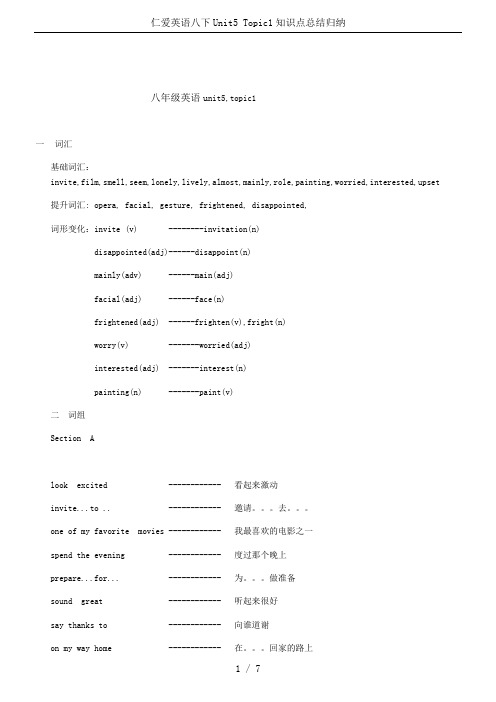
八年级英语u nit5,topic1一词汇基础词汇:invite,film,smell,seem,lonely,lively,almost,mainly,role,painting,worried,interested,upset 提升词汇: opera, facial, gesture, frightened, disappointed,词形变化:invite (v) --------invitation(n)disappointed(adj)------disappoint(n)mainly(adv) ------main(adj)facial(adj) ------face(n)frightened(adj) ------frighten(v),fright(n)worry(v) -------worried(adj)interested(adj) -------interest(n)painting(n) -------paint(v)二词组Section Alook excited ------------ 看起来激动invite...to .. ------------ 邀请。
去。
one of my favorite movies ------------ 我最喜欢的电影之一spend the evening ------------ 度过那个晚上prepare...for... ------------ 为。
做准备sound great ------------ 听起来很好say thanks to ------------ 向谁道谢on my way home ------------ 在。
回家的路上felt disappointed ------------ 感到失望be able to do ------------ 有能力做what a pity ------------ 多遗憾Section Bget a ticket to ------------- 得到。
Unit5Topic1教学内容整合仁爱七年级英语下册

Unit 5 Topic 1 I usually come to school by subway一、单词gate,by, subway, underground,always,plane,train$hip,boat,weekday, earlybird, catch, worm, sometimes, seldom, walk, never, ride, park,, Waetirdvisiion, soccer, movie, begin, after, bed, basketball, swim, listen, music, library, week, onc 二、词组come on, on foot, watch at school, listen to三、句型(1)一Happy New Year!一The same to you!(2)一How do you usually come to school?一I usually come to school by subway.(3)一What time do you usually get up on weekdays?——I always get up at aboufclixko(4)I seldom walk to school. I often come by subway.(5)Li Xiang often rides a bike to school.(6)Maira sometimes takes the subway home.(7)一What does Han Qing usually do after school?一He usually plays soccer, but hit doteyi basketball.(8)一How often do you come to the library? 一Three times a week.四、功能句1.学会询问他人的日常交通方式。
仁爱版七年级下册Unit5_Topic1_知识点归纳
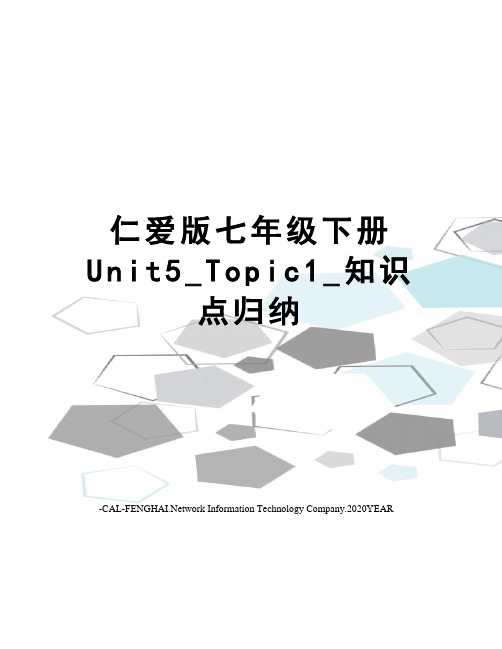
仁爱版七年级下册U n i t5_T o p i c1_知识点归纳work Information Technology Company.2020YEARUnit 5 Our School LifeTopic 1 How do you usually come to school?一、重点短语:Come on on foot take a bus by bus after school a short time listen toWatch TV know about be over in one’s free time on weekdays go to bed二、重点句型:1. I never come to school by subway.2. Maria sometimes takes the subway home.3. We usually go to the park on foot.4. I seldom walk to school.5. Li Xiang often rides a bike to school.6. They always go to the zoo by bus.7. --Happy New Year! --Happy New Year!/ The same to you.8. The early bird catches the worm.9. She goes to bed at about a quarter to ten.10. --How often do you come to the library--Three times a week./ Very often./三、重点知识点1. The same to you也祝你……。
用于别人向你祝福时对对方的回应,相当于You, too!e.g.-- Have a nice weekend!周末愉快! -- The same to you!也祝你愉快!2. look在此为系动词,表示“看起来……,看上去……”,后面接形容词。
- 1、下载文档前请自行甄别文档内容的完整性,平台不提供额外的编辑、内容补充、找答案等附加服务。
- 2、"仅部分预览"的文档,不可在线预览部分如存在完整性等问题,可反馈申请退款(可完整预览的文档不适用该条件!)。
- 3、如文档侵犯您的权益,请联系客服反馈,我们会尽快为您处理(人工客服工作时间:9:00-18:30)。
Unit 5 Topic 1班级___________ 姓名____________ 座号____________ 评分____________Ⅰ. 单项选择。
(20分)( )1. The Browns usually drive to the park on Sundays. But today they go to the park _____ foot.A. inB. onC. byD. of( )2. Bob often _____ his homework after dinner.A. doB. doesC. doingD. to do( )3. The boy likes playing _____ basketball very much.A. aB. anC. theD. /( )4.—_____ does Kangkang meet his friends?—Four times a month.A. How oftenB. How longC. WhenD. What time( )5.—What do you usually do _____ weekdays after school?—I usually read books.A. inB. atC. onD. for( )6. Mr. King sometimes _____ the subway home.A. takeB. takingC. takesD. to take( )7. —What does Fang Yan do in her free time?—She often _____ a movie.A. seesB. watchC. looksD. read( )8. —_____—The same to you.A. Good morning!B. Happy New Year!C. See you later.D. How do you do?( )9. Zhao Lin _____ to Beijing by train often. He usually goes by plane.A. isn’t goingB. doesn’t goC. not goD. don’t go( )10.—Your new dress looks very nice!—_____A. Yes, it is so nice.B. Where? Where?C. Thank you.D. That’s all right.Ⅱ. 完形填空。
(10分)On Sundays, Li Lei gets up at six thirty. He has 16 at eight. Then he helps his mother 17 the housework(家务劳动). At ten o’clock he leaves 18 and goes shopping 19 bike. At about eleven o’clock he comes 20 home.He likes 21 very much. He helps his mother with the cooking. They 22 lunch at twelve.In the afternoon he often 23 games with his friends. They have 24 at six thirty. In the evening he does his homework. Sometimes, he 25 TV. He goes to bed at nine.( )11. A. food B. breakfast C. lunch D. supper( )12. A. in B. on C. with D. from( )13. A. home B. house C. room D. classroom ( )14. A. by B. on C. in D. at( )15. A. for B. to C. back D. from( )16. A. cook B. cooking C. the cook D. the cooking ( )17. A. to have B. having C. have D. has( )18. A. plays B. is playing C. takes D. is taking ( )19. A. work B. homework C. housework D. dinner( )20. A. sees B. looks C. is watching D. watchesⅣ. 阅读理解。
(30分)(A)Hi, I’m Zhu Hua. I’m a junior high school student in Beijing. There are twenty-six boys and twenty-two girls in my class. Half of the students come to school by bike. Five boys and four girls come to school on foot. About a quarter of us come to school by bus. The others come to school by subway. We’re all from China. We’re good friends.(B)Alice is my good friend. She is twenty-two years old. Now she lives in Beijing, China. She teaches English in a junior high school. She loves making friends with the students and they like her very much. Every morning she gets up very early. At about 7:00, she usually has a glass of milk and some bread for breakfast at home. Then she walks to work and gets to school at about a quarter to eight. At 12:00 she eats a hamburger and an apple for lunch. Her favorite drink is Coke. She goes home at 5 o’clock in the afternoon. She likes to have noodles(面条)and chicken for dinner. On Sunday, she often comes to see me. Sometimes we go to a Chinese restaurant to have lunch.根据短文内容,选择正确答案。
( )26. Alice is _______.A. a doctorB. a nurseC. a driverD. a teacher ( )27. —What does Alice usually have for breakfast at home?—_______A. A glass of milk and some bread.B. An egg and some bread.C. A cup of coffee and some bread.D. A glass of milk and a hamburger.( )28. Alice gets to school _______ a. m.A. at 8:15B. at 7:45C. at 7:40D. at 8:00( )29. —What does Alice often do on Sunday?—She often ________.A. has dinner with meB. goes to the restaurantC. comes to see meD. eats noodles( )30. Which of the following is NOT true?A. Alice lives in China now.B. Alice likes Coke best.C. Alice gets home at 5:00 in the afternoon.D. On weekdays she has a hamburger and an apple for lunch.(C)()31. Li Huimin, Wan Junfeng and Chen Qiang all _____ in their free time.A. watch TVB. meet friendsC. cook foodD. play games()32. Chen Qiang doesn’t _____.A. meet friendsB. cook foodC. watch TVD. A and B()33. Li Huimin and Wang Junfeng _____ in their free time, but Chen Qiang doesn’t.A. go fishingB. watch TVC. meet friendsD. play computer games ()34. Wang Junfeng does many things in his free time EXCEPT(除了) _____.A. watching TVB. cooking foodC. going fishingD. playing computer games ()35. Which of the following is TRUE?A. Li Huimin and Wang Junfeng doesn’t play computer games.B. Chen Qiang cooks food.C. Wang Junfeng goes fishing.D. Chen Qiang and Wang Junfeng meet friends.第三部分写作(25分)Ⅰ. 词汇部分。
